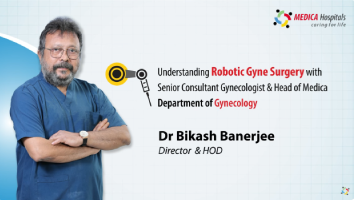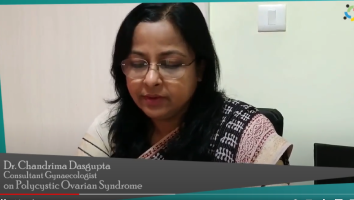Comprehensive Endometriosis Treatment at Medica
The endometrium is a specialized tissue that lines the inner side of the uterus. Every month, this tissue accumulates. If the women become pregnant, this tissue helps maintain the pregnancy. However, if the woman is not pregnant, this tissue sheds every month during the menstrual cycle. Hormonal changes at the time of the menstrual cycle control the activity of cells of this tissue. But after shedding, these tissues do not have a path to go out of the body. Instead, it is trapped inside the pelvic region and causes several symptoms.
In some women, these tissues leave the uterus and place themselves in the nearby areas of the female reproductive system. Thus, when there is a change in the hormonal levels, these cells show activity similar to uterine tissues. This condition of growth of uterine tissues in any other organ is known as endometriosis. The uterine tissue may reach the fallopian tubes, ovaries, cervix, vulva, and other parts of the pelvic region. The uterine tissues may also reach the brain or lungs in very rare cases.
Medica’s Obstetrics and Gynaecology department endeavors to bring the highest quality of treatment and service to you. We believe in administering holistic management of all patients, encompassing their mental, physical and emotional health as a means to provide a complete solution for all their gynaecological problems. Our department is fully integrated with state-of-the-art treatment units and facilities that enable our Gynaecologists to treat you better.
Free Doctor Assessment
Symptoms
Women with endometriosis have the following symptoms:
- Pain during periods
- Pain during urination and bowel movements
- Infertility
- Pain in lower back and abdomen
- Pain during intercourse
- Heavy bleeding during or between the periods
- Diarrhea and constipation
- Nausea and vomiting
- Bloating and fatigue
- Severe menstrual cramps
- Blood in the urine
During their reproductive years, endometriosis affects about one out of every ten women.
Seek help from an expert
Causes
The correct cause of endometriosis is not known. However, several factors increase the risk of endometriosis. These are:
- Peritoneal Cell Change: Some women are at high risk for change in the peritoneal cells. These cells are on the inner lining of the abdomen. These cells convert to the endometrial tissues due to hormonal or immune system problems.
- Retrograde Menstruation: Women may also have endometriosis due to retrograde menstruation. In this condition, the blood flows back towards the fallopian tube and does not leave the body through the vagina. This blood can reach the pelvic cavity to cause endometriosis.
Transportation of Endometrial Cells: The endometrial cell shed during each menstrual cycle. The blood or lymphatic system may carry these cells to other body parts. - Disorder of the Immune System: In most cases, when the endometrial tissues reach other organs, the immune system identifies and kills them. Women with poor immune systems are at high risk for endometriosis. Their immune systems cannot kill the endometrial cells that reach other organs.
- Implantation of Surgical Scar: Women with the cesarean section may have endometriosis. Some uterus cells may transplant to the abdominal wall during the suturing after the surgery.
Genes: Women are at higher risk if their mother or sister suffers from this condition. - Menstrual Problems: Some menstrual issues increase the risk. These are the early menstrual cycle, late menopause, heavy menstrual bleeding, and short menstrual cycle.
- Hormonal Issues: Hormonal problems also increase risk. A high level of estrogen and increased exposure to estrogen also cause this condition.
Other risk factors: Other risk factors are reproductive tract diseases, not giving birth once, and low body mass index.
Diagnosis
There are several methods to diagnose this condition. Some of them are:
- Consultation: The doctor asks the patient about the types and duration of symptoms. The doctor also gets information about any other woman in your family who has endometriosis. The doctor also asks about the location and timing of pain.
- Pelvic Examination: The doctor may also perform a pelvic exam. The doctor checks the pelvic area during the test to determine any scars or cysts. Most of the time, the doctor may not feel the smaller cysts.
- Ultrasound: The doctor may also suggest the patients for an ultrasound. It may be abdominal or transvaginal ultrasound. The test may not identify the endometriosis but can find the cysts due to the condition.
- Medicine: If the doctor cannot find the presence of ovarian cysts, he may give some drugs to the patients. These are birth control hormones and GnRH-releasing hormone. If the patient gets relief with these drugs, there may be endometriosis.
- Magnetic Resonance Imaging: Magnetic resonance imaging helps the doctor diagnose by making clear images. It also helps the surgeon in determining the exact location of the tissue.
- Laparoscopy: The doctor may also suggest laparoscopy for diagnosing the condition. The doctor views the abdominal area through the laparoscope. He may also remove the tissues simultaneously.

Minimally Invasive
Surgery

World Renowned
Experts
![]()
EMI Facility
Available

Covid Safe
Environment
Treatment
Following are the treatment option for endometriosis:
- Medications: The doctor may give several drugs to the patients. These include pain-relieving drugs and hormonal drugs. The hormonal therapy contains aromatase inhibitors, progestin, hormonal contraceptives, and GnRH-releasing hormone agonists and antagonists.
- Fertility Treatment: It also causes infertility. The doctor may suggest the type of treatment based upon the location of endometrial tissues.
- Conservative Treatment: The doctor may also advise surgery for removing the endometrial tissue. It will increase the chance of pregnancy. It also reduces pain and heavy menstrual bleeding.
- Ovary Removal: In rare cases, the surgeon may advise removing ovaries. However, most doctors did not prefer this. Menopause occurs due to removing the ovaries. It will increase the risk of cardiovascular disease and metabolic conditions.
- Lifestyle Remedies: Lifestyle remedies may help in managing the symptoms of endometriosis. The patient may take over-the-counter pain management drugs. She may also use heating pads and take warm baths to manage cramps and pain.
Ideal treatment is one that is effective in a disease in all the circumstances. However, the treatment of endometriosis depends upon the condition of the patients. Thus, there is no ideal treatment for this condition. One of the best treatments is laparoscopic surgery. This surgery removes the tissue without harming the other nearby organs.














